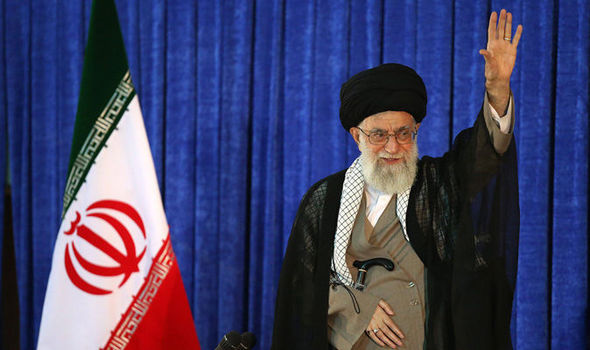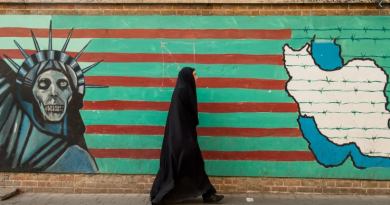The Cat, the Mouse, the Tyrant and his Referendum
by Firouz Farzani
The Islamic Republic has never allowed any impartial, especially foreign, authority to evaluate Iran’s institutions and practices.
On April 1,1979, millions of citizens voted in a referendum to establish the Islamic Republic of Iran. (The only other option on the ballot was a return to monarchy.)
This year, the 40th anniversary of that vote, some brave dissident voices in Iran, including the great human rights lawyer Nasrin Sotoudeh, signed a petition calling for another referendum to establish whether a majority of our citizens still back the regime. If not, they argued, the referendum would be a mandate for root and branch political reform.
Sotoudeh is now in prison for, among other things, signing that petition. I have enormous respect for her courage and perseverance, but I have to say that in the matter of the referendum she and the other signatories are naïve.
No despotic regime has ever peacefully ceded power.
Dictators only hold referendums they know they will win — whatever it takes.
Remember the farcical referendum in 2002 in Iraq, which “ratified” seven more years in office for Saddam Hussein? Voter turnout was 100 percent and every single ballot supported the tyrant.
Those who call for a referendum in Iran argue that the UN and international observers could ensure it was free and fair. That’s just pie in the sky. The Islamic Republic has never allowed any impartial, especially foreign, authority to evaluate Iran’s institutions and practices.
Referendums may be a common tool in countries like Switzerland, the Netherlands and Spain. That’s because they enjoy democratic stability and the rule of law – the fruits of a thousand years of political evolution. They are fundamentally different from the authoritarian regimes of our region.
The Iranian regime has consistently eliminated any threats to itself. The year 1988 saw one of the most savage campaigns — the so-called “Chain Murders.” A group of liberals and members of the Iranian branch of PEN, including Mohammad Jafar Pouyandaneh , Ebrahim Zalzadeh and Mohammad Mokhtari, had got in touch with the judiciary, and were pressing publicly for freedom of association and an end to censorship. The reaction of the regime was merciless — agents from the security forces hunted them down and shut them up. The best estimates say 98 people were killed or disappeared.
As I thought about brave Sotoudeh and the campaign for a second referendum in Iran, I couldn’t help remembering a wise 14th century Iranian tale. It is “The Story Of the Cat and Mouse” by Obeyd Zakani, about a kingdom of mice tyrannized by a huge “dragon-jawed, pot-bellied, barrel-chested, leopard-clawed” cat.
This cat, having eaten a defenceless mouse, goes to the mosque and – wishing to appear pious – publicly repents. Of course he feels no remorse at all, but another mouse overhears his words and is convinced that the cat has been transformed by a religious epiphany.
He rushes off to tell the other mice that the cat is now a kinder, gentler creature, and they resolve to reward the cat with gifts.
Here is an excerpt from the wonderful translation by Dick Davis.
Behind the pulpit lurked a little mouse
Who quickly bore the news off to his house:
“Great news, the cat’s converted, he repents.
He’s filled with sacred Muslim sentiments;
This paragon of pious virtues keeps
Prayer vigils in the mosque, and moans and weeps”.
Then when they heard the news the laughing mice
Seemed blessed with all the joys of paradise,
And seven elders of the mousey nation
Were chosen as a special deputation ―
Each of them carried something rare and fine
To give the cat: one bore a glass of wine
And one a spit of lamb kebab, another
Took currants in a salver, while his brother
Sported a tray of figs, one cheese he’d made,
And one, a syrup of sweet lemonade.
One bore him yogurt, butter and fresh bread,
The last a tray of rice upon his head.
The mice drew near the cat, and with salaams
And deepest bows and eulogistic psalms
They greeted him: “O thou for whom all mice
Would undergo the final sacrifice
Accept the gifts we offer you, O Lord.”
He peered at them and chanted, “Your reward
Will be in heaven; I’ve fasted now for days
To please the Merciful beyond all Praise.
Whoever does God’s work, it’s certain he
Will be rewarded, and abundantly!”
Then he continued: “Come closer, do….
Dear Friends, a few more steps…a very few…”
Then, frail as trembling aspen leaves, the mice
Went forward in a group – and in a trice
The cat leapt like a mighty champion, like
A fighter who sees when and where to strike;
Five mice he captured – two in each front paw
And one was snapped up in his lion-like jaw.
The story is really a parable. Zakani is reminding us that tyrants who exercise power through violence always revert to type. And when challenged, the consequences are always terrible.
P.S. Karl Popper, the favorite philosopher of Iranian reformists, defines a democratic regime as one which, while still in office “provides the circumstances of its own subversion by the opposition. “
By this measure, our current rulers are about as far as it’s possible to get from democratic.
Article first appeared in Iran Wire.


